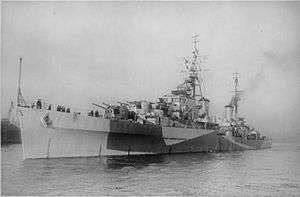HMS Diadem (84)
 | |
| History | |
|---|---|
| Name: | HMS Diadem |
| Builder: | R. and W. Hawthorn, Leslie and Company, Limited (Hebburn-on-Tyne, UK) |
| Laid down: | 15 December 1939 |
| Launched: | 21 August 1942 |
| Commissioned: | 6 January 1944 |
| Decommissioned: | 1950 |
| Reclassified: | In reserve between 1950 to 1956 |
| Fate: | Sold to the Pakistan Navy on 29 February 1956 |
| Name: | Babur |
| Acquired: | 29 February 1956 |
| Commissioned: | 5 July 1957 |
| Renamed: | Jahangir |
| General characteristics | |
| Class and type: | Dido-class light cruiser |
| Displacement: |
|
| Length: |
|
| Beam: | 50.5 ft (15.4 m) |
| Draught: | 14 ft (4.3 m) |
| Propulsion: |
|
| Speed: | 32.25 knots (60 km/h; 37 mph) |
| Range: |
|
| Complement: | 530 |
| Armament: |
|
| Armor: |
|
HMS Diadem was a Dido-class light cruiser of the Bellona subgroup of the Royal Navy. She was a modified Dido design with only four turrets but improved anti-aircraft armament - also known as Dido Group 2. She was built by R. and W. Hawthorn, Leslie and Company, Limited (Hebburn-on-Tyne), UK), with the keel being laid down on 15 December 1939. She was launched on 21 August 1942, and commissioned 6 January 1944.
Service history
Royal Navy service
Diadem served on the Arctic convoys and covered carrier raids against the German battleship Tirpitz in the early months of 1944, then became part of Force G off Juno Beach during the invasion of Normandy in June. After the landings she carried out offensive patrols against German shipping around the Brittany coast, sinking, with destroyers, Sperrbrecher 7 off La Rochelle on 12 August. She returned to northern waters in September, where she covered Russian convoys and carrier raids against German shipping routes along the Norwegian coast, as well as making offensive sweeps herself. In the course of one such sweep, accompanied by HMS Mauritius on 28 January 1945, the cruiser engaged three German destroyers, damaging Z31. Diadem remained with the 10th Cruiser Squadron until after the war, and served in the Home Fleet until 1950. She was placed in reserve between 1950 to 1956. She was sold to the Pakistan Navy (announced) 29 February 1956 and refitted at Portsmouth Dockyard before being handed over to the Pakistan Navy as Babur on 5 July 1957.[1]
Pakistan service
The refit was substantial, the light armament was standardised as 14 40 mm guns in three twin mounts, Mk 5 and eight single mounts. Radar was substantially updated to 974 navigation, 293 target indicator and air warning 281B at near 960 capability similar to HMS Euralyus in 1954. She was renamed Babur, after the founder of the Mogul empire. She was later renamed Jahangir, and converted into a training ship for cadets in 1961.[2] Nevertheless, she was operationally deployed in a clash with India in 1965, and carried out a shore bombardment of Dwarka in September 1965.[3]
References
Publications
- Colledge, J. J.; Warlow, Ben (2006) [1969]. Ships of the Royal Navy: The Complete Record of all Fighting Ships of the Royal Navy (Rev. ed.). London: Chatham Publishing. ISBN 978-1-86176-281-8. OCLC 67375475.
External links
| Wikimedia Commons has media related to HMS Diadem (ship, 1942). |